|
|
|
Sort Order |
|
|
|
Items / Page
|
|
|
|
|
|
|
| Srl | Item |
| 1 |
ID:
109932
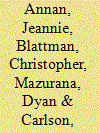

|
|
|
|
|
| Publication |
2011.
|
| Summary/Abstract |
What are the impacts of war on the participants, and do they vary by gender? Are ex-combatants damaged pariahs who threaten social stability, as some fear? Existing theory and evidence are both inconclusive and focused on males. New data and a tragic natural quasi-experiment in Uganda allow us to estimate the impacts of war on both genders, and assess how war experiences affect reintegration success. As expected, violence drives social and psychological problems, especially among females. Unexpectedly, however, most women returning from armed groups reintegrate socially and are resilient. Partly for this reason, postconflict hostility is low. Theories that war conditions youth into violence find little support. Finally, the findings confirm a human capital view of recruitment: economic gaps are driven by time away from civilian education and labor markets. Unlike males, however, females have few civilian opportunities and so they see little adverse economic impact of recruitment.
|
|
|
|
|
|
|
|
|
|
|
|
|
|
|
|
| 2 |
ID:
154365
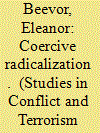

|
|
|
|
|
| Summary/Abstract |
A framework for understanding Islamic State of Iraq and al-Sham (ISIS)'s apocalyptic theology as an internal strategy to “coercively radicalize” its captive subjects is presented, by comparison to the Lord's Resistance Army (LRA), which shares key stages of captive indoctrination with ISIS. A violent experience of “entry,” religious rules learned in an “assimilation” process, and millenarian “grand narratives” framing violence as purification, are examined. These stages construct an image of group leaders as divinely endowed with spiritual knowledge and access (i.e., charismatic authority). This can create a sense of dependency on the leaders and their instructions, potentially motivating violent and altruistic behavior from initially unwilling subjects.
|
|
|
|
|
|
|
|
|
|
|
|
|
|
|
|
| 3 |
ID:
178008
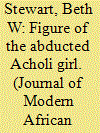

|
|
|
|
|
| Summary/Abstract |
Based on analysis of newspapers and secondary sources, this article examines the gendered construction of the national imagery of the war between the Ugandan government and the Lord's Resistance Army (LRA) in an effort to expand current conceptual understanding of the exclusion experienced by children born of forced marriage inside the LRA. Uganda developed as a militarised and masculine post-colony and yet nation-building for President Museveni involved crafting a national imagery that drew upon development discourses of gender and children to position himself as the benevolent father of the nation. Invoking Veena Das’ ‘figure of the abducted woman’, I argue that the Ugandan government mobilised the figure of the abducted Acholi girl to legitimise both its governance and the war. The article concludes that the resulting narrative provided no legitimate social or political space in the national imagery for the children of the abducted girls.
|
|
|
|
|
|
|
|
|
|
|
|
|
|
|
|
| 4 |
ID:
132354
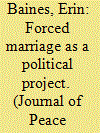

|
|
|
|
|
| Publication |
2014.
|
| Summary/Abstract |
One of the most vexing contradictions about the Uganda originated rebel group, the Lord's Resistance Army (LRA), is the fact that it institutionalized forced marriage on the one hand, while actively discouraging sexually immoral behavior on the other: rape, sexual violence, and promiscuity both within the group and outside it were punishable by severe beating or death. What explains this contradiction? The article suggests that in addition to maintaining discipline and control over a diverse and reluctant group, forced marriage and the regulation of sexual relations reproduced a political project of imagining a 'new Acholi' nation. The article draws on original data collected in focus group discussions with former commanders and wives to commanders to discuss the historical evolution of this vision, how the LRA enforced rules regarding sexual behavior, and finally, the way forced marriage implicated women and girls in the organization of power and domination in the group until it was forced from permanent bases in Sudan in 2002.
|
|
|
|
|
|
|
|
|
|
|
|
|
|
|
|
| 5 |
ID:
104058
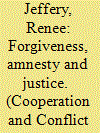

|
|
|
|
|
| Publication |
2011.
|
| Summary/Abstract |
The practice of forgiveness in processes of conflict resolution and post-conflict justice is confronted by two sets of serious criticisms. First, scholars and practitioners alike have questioned whether or not the fundamentally interpersonal practice of forgiveness can be readily and legitimately transposed to broader socio-political contexts. Second, questions have also been raised concerning the potential for forgiveness, particularly when associated with amnesties, to jeopardize and even circumvent the application of justice in post-conflict contexts. By contrast, supporters argue that forgiveness is not only possible but necessary in politics and, by drawing a distinction between amnesties and forgiveness, and restorative and retributive forms of justice, that forgiveness contributes to the achievement of restorative justice. By analysing the role that forgiveness is playing in bringing almost two decades of conflict between the Lord's Resistance Army and the Ugandan government to an end, this article demonstrates that a disjuncture exists between the theoretical treatment of forgiveness and the practice of political forgiveness. That is, it demonstrates, contrary to arguments made by both its supporters and critics, that political forgiveness, even when conceived in conjunction with amnesties, may contribute to both restorative and retributive forms of justice.
|
|
|
|
|
|
|
|
|
|
|
|
|
|
|
|
| 6 |
ID:
127173


|
|
|
| 7 |
ID:
132339
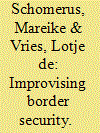

|
|
|
|
|
| Publication |
2014.
|
| Summary/Abstract |
This article compares two cases of securitization along South Sudan's border with the Democratic Republic of the Congo. By comparing how a security concern - the presence of the Lord's Resistance Army - was interpreted and responded to, the article shows that border security practices in two borderscapes are improvised, contradictory and contested, and serve to establish authority rather than actually securing the border. This is apparent on three levels: (a) through the multiplicity of security actors vying for authority; (b) in how they interpret security concerns; and (c) in terms of what practice follows. The article argues that by allowing authority at the border to be taken by actors that are not under direct control of the central government, the South Sudanese state is developing as one that controls parts of the country in absentia, either by granting discretionary powers to low-level government authorities at the border or through tactical neglect. Processes of securitization by both state and non-state actors in the borderland are largely disconnected from the South Sudanese central government, which does not claim authority over this border and thus seemingly does not consider the lack of security for its citizens, and the parallel authorities, as a threat to central stability.
|
|
|
|
|
|
|
|
|
|
|
|
|
|
|
|
| 8 |
ID:
126991
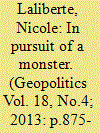

|
|
|
|
|
| Publication |
2013.
|
| Summary/Abstract |
Through a feminist geopolitical analysis, this article interrogates the role of monster narratives in producing geographic imaginaries of difference and lived experiences of insecurity in northern Uganda. Building upon theories of monsters as cultural imaginaries, I argue that state and non-state actors evoke colonial-era constructions of difference to construct Joseph Kony, leader of the Lord's Resistance Army (LRA), as a monster to support contemporary geopolitical agendas. By troubling state-based definitions of security, this article disputes the idea that security practices predicated on the defeat of a monster translate into increased security for those most directly affected by the violence of the monster. Additionally, this article discusses alternative narratives circulating in northern Uganda that offer different readings of Kony's role in the cycles of violence that have ravaged the region. These narratives, when viewed through a feminist geopolitical lens, challenge the monster imaginary and, with it, the geopolitics of militarisation.
|
|
|
|
|
|
|
|
|
|
|
|
|
|
|
|
| 9 |
ID:
137757


|
|
|
|
|
| Summary/Abstract |
During the last decade, the Lord's Resistance Army (LRA) became a regional problem in the border area of the Democratic Republic of Congo, South Sudan, and the Central African Republic, involving multiple national and international actors. This article explains why these actors often present diametrically opposed images of the LRA instead of developing a unified vision. More specifically, the article discusses how the Ugandan and Congolese governments and armies, and the US government and advocacy groups, each frame the LRA differently. These various frames are influenced by the actors' interests and by the specific historical development of political relations between them. Politically influential constituencies played a significant role in this endeavour. In the US, lobby groups such as Invisible Children, Enough, and Resolve had an important impact on the way in which the American government framed the LRA. Conversely, the lack of such a powerful constituency in the LRA-affected countries gave these governments ample space to frame the LRA in a variety of ways. The lack of reliable information about the current capacities of the LRA, combined with the LRA's lack of a strong and coherent image, further contributed to this situation. In short, the ways in which the LRA is framed enabled these key actors to pursue goals that may remain distant from the reality of the LRA.
|
|
|
|
|
|
|
|
|
|
|
|
|
|
|
|
| 10 |
ID:
052759
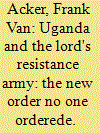

|
|
|
|
|
|
|
|